
The territory of Chile has been populated since at least 3000 BC. By the 16th century, Spanish invaders began to raid the region of present-day Chile, and the territory was a colony between 1540 and 1818, when it gained independence from Spain. The country's economic development was successively marked by the export of first agricultural produce, then saltpeter and later copper. The wealth of raw materials led to an economic upturn, but also led to dependency, and even wars with neighboring states. Chile was governed during most of its first 150 years of independence by different forms of restricted government, where the electorate was carefully vetted and controlled by an elite.

Chile's government is a representative democratic republic, in which the President of Chile serves as both head of state and head of government, within a formal multi-party system. Executive power is exercised by the president and their cabinet. Legislative power is vested in both the government and the two chambers of the National Congress. The judiciary operates independently of both the executive and legislative branches.
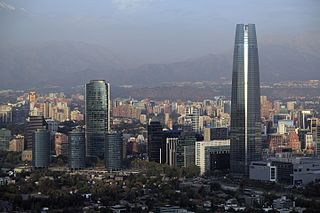
The economy of Chile operates as a market economy and is classified as a high-income economy by the World Bank. It is recognized as one of the most prosperous countries in South America, leading the region in areas such as competitiveness, income per capita, globalization, economic freedom, and low levels of perceived corruption. Despite its prosperity, Chile experiences significant economic inequality, as reflected by its Gini index, though this is close to the regional average. Among Organisation for Economic Co-operation and Development (OECD) countries, Chile has a robust social security system, with social welfare expenditures amounting to approximately 19.6% of GDP.

The Andean Community is a free trade area with the objective of creating a customs union comprising the South American countries of Bolivia, Colombia, Ecuador, and Peru. The trade bloc was called the Andean Pact until 1996 and came into existence when the Cartagena Agreement was signed in 1969. Its headquarters are in Lima, Peru.

The Union of South American Nations (USAN), sometimes also referred to as the South American Union, abbreviated in Spanish as UNASUR and in Portuguese as UNASUL, is an intergovernmental regional organization. It once comprised twelve South American countries; as of 2019, most have withdrawn. It was set up by Hugo Chavez to counteract the influence of the United States in the region.
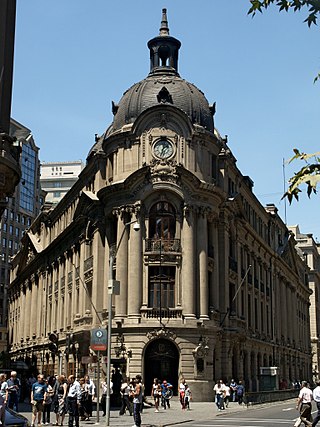
The Santiago Stock Exchange (SSE), founded on November 27, 1893, is Chile's dominant stock exchange, and the third largest stock exchange in Latin America, behind Brazil's BM&F Bovespa, and the Bolsa Mexicana de Valores in Mexico. On December 5, 2014, the Santiago Stock Exchange announced it was joining the United Nations Sustainable Stock Exchanges (SSE) initiative, becoming the 17th Partner Exchange of the initiative.

Lota is a city and commune located in the center of Chile on the Gulf of Arauco, in the southern Concepción Province of the Biobío Region, 39 kilometres south of Concepción, and is one of the ten cities (communes) that constitutes the Concepción metropolitan area. The city is mostly known for being the traditional centre of coal mining in Chile, albeit mining ended in the 1990s.

Ricardo Andrés Lagos Weber, son of former Chilean president Ricardo Lagos, is a politician who served as the Ministry General Secretariat of Government of Chile in the administration of former President Michelle Bachelet after having worked for Bachelet's 2005-2006 campaign. He is trained in law and economics, and has served the majority of his government career in economic positions. He was also an organizer and the senior representative for Chile at the Annual Meeting of APEC held in Chile in 2004, in addition to being one of the architects of the free trade agreements that Chile signed with the United States and the European Union as the head of the Foreign Ministry's Department of Trade Policy. He is a member of the Party for Democracy (PPD). Between March 2016 and March 2017 he was President of the Senate of Chile.

Chile–Russia relations are the bilateral foreign relations between Chile and Russia. The establishment of diplomatic relations between Chile and the USSR countries happened on December 11, 1944.
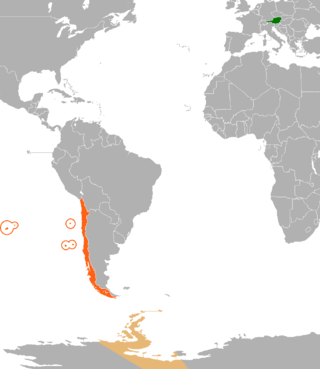
Austria–Chile relations are the bilateral relations between Austria and Chile. Both nations are members of the Organisation for Economic Co-operation and Development and the United Nations.
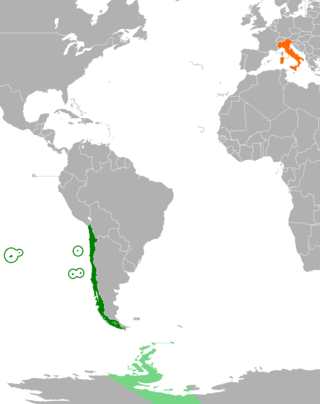
Chile–Italy relations are the current and historical relations between the Republic of Chile and the Italian Republic. The relationship between Chile and Italy is based on a long history of contacts that have taken place at the political level, but also due to the presence of an important Italian community in Chile and Chileans in Italy. Both nations are members of the OECD and the United Nations.

Chile and Croatia both enjoy friendly relations, the importance of which centers on the history of Croatian migration to Chile. There is a community of approximately 200,000 - 400,000 Chileans of Croatian descent.
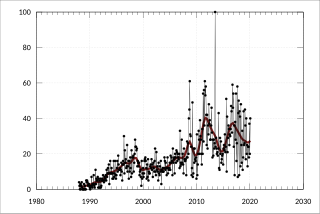
The Australia–Chile Free Trade Agreement is a trade agreement between the countries of Chile and Australia. It was signed on July 30, 2008 and went into effect in the 1st quarter of 2009. The agreement was intended to go into effect on January 1, 2009, but was delayed due to Chile not being able to finish its ratification in time.

British–Chile relations are foreign relations between the United Kingdom and Chile. The two countries maintain strong cultural ties as Chilean culture was somewhat anglicised after independence, seeing many mutual investments since. Standard visits, on terms each country applies, allow visitors and short-term study, without need for a travel visa endorsed in a passport.

Chile–Spain relations are the current and historical relations between Chile and Spain. Both nations are members of the Association of Spanish Language Academies, Organization of Ibero-American States, Organisation for Economic Co-operation and Development and the United Nations.

Jorge Matías Donoso Gárate, known as Matías Donoso, is a Chilean footballer who plays as a forward for Universidad de Concepción in the Primera B de Chile.

The nations of Mexico and Peru established diplomatic relations in 1823. Diplomatic relations were briefly cut in 1932 and reinstated again in 1933. Both nations are members of the Asia-Pacific Economic Cooperation, Community of Latin American and Caribbean States, Lima Group, Organization of Ibero-American States, Organization of American States, Pacific Alliance and the United Nations.
The following lists events that happened during 1953 in Chile.

Chile–Sweden relations refers to the diplomatic relations between Chile and Sweden. Both nations enjoy friendly relations, the importance of which centers on the history of Chilean migration to Sweden during the 1970s. Approximately 100,000 Chileans and their descendants reside in Sweden, making the country home to the third largest Chilean diaspora community. Both countries are members of the Organisation for Economic Co-operation and Development.
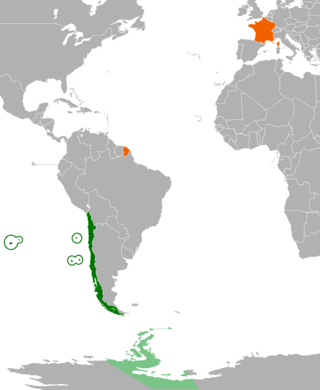
Chile–France relations are the diplomatic relations between Chile and France. Both nations are members of the Organisation for Economic Co-operation and Development, United Nations and the World Trade Organization.



















